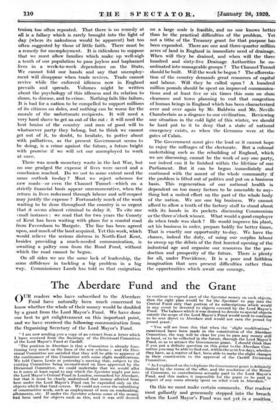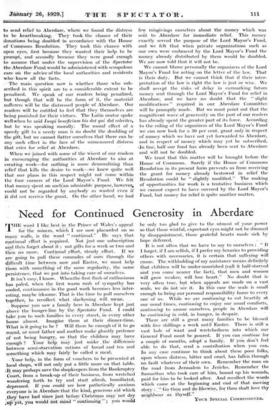The Aberdare Fund and the Grant
.OUR readers who have subscribed to the Aberdare Fund have naturally been much concerned to know whether the whole of their money would be doubled by a grant from the Lord Mayor's Fund. We have done our best to get enlightenment on this important point, and we have-received -the- following---eommunication from the Organizing Secretary of the Lord Mayor's Fund.
" I am now sending you a copy of an extract from a letter which I have received from the Secretary of the Divisional Committee of the Lord Mayor's Fund at Cardiff.-
The position in Aberdare is that a Committee is already func- tioning very much on the lines of the new scheme ; and the Divi- sional Committee are satisfied that they will-be able to approve of the continuance of this Committee with some slight modifications. We told Canon Lewis at yesterday's meeting that, subject to the existing Committee being reconstituted on lines approved by the Divisional Committee, we could undertake that we would allot to it sums at least equal to any which the Spectator might put into the Lord Mayor's Central Fund in London, earmarked for Aberdare, but that it must be clearly understood that motley allotted from here under the Lord Mayor's Fund can be expended only on the objects which that fund covers. We could not cover the subsidising of constructive work, such as employment of men on roadmaking, allotments, etc. If under the Spectator scheme some of the money had been used for objects such as this, and it . was still desired to continue to expend part of the Spectator money on such objects, then the right plan would be for the Spectator to pay into the Central Fund only that portion of its subscriptions which would in any event be devoted to objects covered by the Lord Mayor's Fund. The balance which it was desired to devote to special objeCtis outside the scope of the Lord Mayor's Fund would need to continue to be sent direct to Aberdare and would not earn the pound for pound grant.'
"You will see from this that when the 'slight modifications' mentioned have been made in the constitution of the Aberdare Committee, the way will be clear for you to pass any money still in hand, or to be collected- in the future, through the Lord Mayor's Fund, so as to attract the Government grant. I should think that if you put a. definite question on this point to the Aberdare Com- mittee you may be able to find out, within the next few days, whether they have, as a.matter °Met, been able to make the slight changes in their constitution to the approval of the Cardiff Divisional Committee.
" As I explained on the telephone the Government grant is definitely limited by the terms of the offer, and the resolution 'of the House' of Commons, to contributions actually paid to the Lord Mayor's Fund, and this makes it impossible for the grant to be paid in respect of any sums already spent on relief work in Aberdare."
On this we must make certain comments. Our readers • most gallantly and generously stepped into the breach when the Lord Mayor's Fund was not yet in a position to send relief to Aberdare, where we found the distress to be heartbreaking. They took the chance of their donations -being doubled in accordance with the House. of '.Commons Resolution. They took this chance with Open eyes, first beeinSe they wanted their help to be prompt, and secondly because they were -good enough to assume that under the supervision of the Spectator the Aberdare Fund would be administered with scrupulous eare on the advice of the local authorities and residents who all the facts.
The main question now is whether those who sub- scribed in this spirit are to a considerable extent to be penalized. We speak of our readers being penalized, but though that will be the form of it, the material sufferers will be the distressed people of Aberdare. Our readers will be entitled to feel that they themselves are `being punished for their virtues. The Latin orator spoke weltwhen he said Inopi beneficium bis dat qui dal celeriter, but he was speaking morally. The .moral effect of a speedy gift to a needy man is iio doubt the doubling of the gift, but we cannot flatter ourselves that there can be any such effect in the face of the unmeasured distress that cries for relief at Aberdare: • When we joined with some of the' wisest of our readers in encouraging the authorities at Aberdare to aim at creating work—for nothing is more demoralizing than relief that kills the desire to work—We knew quite well that our plans in this respect might not Come 'within the -fonr ••corners of the 'Lord' Mayor's 'Fund. We felt that money spent on suchan admirable purpose, howeirer, could not 'be regarded by anybody as wasted even' if . . it- did not receive the grant. On the othethand, we had few misgivings ourselves about the money which was sent to Aberdare' for immediate relief. This money exactly served the purpoSe of the - Lord Mayor's Fund, and we felt that when private organizations such as our own were embraced by the Lord Mayor's Fund the money already distributed by them would be doubled. We are now told that it will not be.
We cannot blame personally the organizers of the Lord Mayor's Fund for acting on the letter of the law. That is their duty. But we cannot think that if their inter- pretation of the law is right the law is just Or wise. We shall accept the risks of delay in earmarking future money sent through the Lord Mayor's Fund for relief in Aberdare,' and we have no doubt that the " slight Modifications' required in our Aberdare CoMthittee will be promptly made. But we must point out that the magnificent wave of generosity on the part of our readers has already spent the greater part of its force. According to the ruling of the organizers of the Lord Mayor's Fund we can now look for a 50 per cent: grant only in' respect of money which we have not yet forwarded to Aberdare, and in respect of money which' may yet be subscribed. -In fine, half our fund has already been sent to -Aberdare and will not be doubled.
We trust that this matter will be brought before the House of Commons. Surely if the House of Commons Resolution in its present form prevents us from receiving the grant for money already bestowed in relief the Resolution could be " slightly modified." The making of opportunities for work is a tentative business which we cannot expect to have covered by the Lord 'Mayor's Fund, but money for relief is quite another matter.









































 Previous page
Previous page